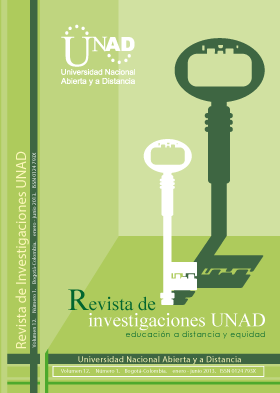Cuando la REVISTA DE INVESTIGACIONES UNAD recibe la postulación de un original por parte de su autor, ya sea a través de correo electrónico o postal, considera que puede publicarse en formatos físicos y/o electrónicos y facilitar su inclusión en bases de datos, hemerotecas y demás sistemas y procesos de indexación. REVISTA DE INVESTIGACIONES UNAD autoriza la reproducción y citación del material de la revista, siempre y cuando se indique de manera explícita el nombre de la revista, los autores, el título del artículo, volumen, número y páginas. Las ideas y conceptos expresados en los artículos son responsabilidad de los autores y en ningún caso reflejan las políticas institucionales de la UNAD
Solving problems in the virtual forum
This paper presents part of the research results conducted with basic education students of the distance learning program from Universidad Pedagógica Tecnológica de Colombia (UPTC). The main goal was to describe and analyze how learning through problem solving in the virtual forum. This study was based on a case study where was analyzed information obtained from the application of different strategy that employed in face-to-face meetings, describing the student learning process.
This study was based on primary sources meaning information obtained from participants interventions in virtual environment. As secondary sources were used minimum bases from three reviewed structured perspectives:, conceptions of learning strategy, troubleshooting approached from the problem concept, problem solving and teaching problem solving strategy, and methodology of distance education supported by virtual learning environments.
With the implementation of “Problem Solving” strategy was promoted a conscious committed and disciplined learning. Where students learned how to learn, learned actively, and in improve continuously their learning process, showing a greater commitment with learning processes.




